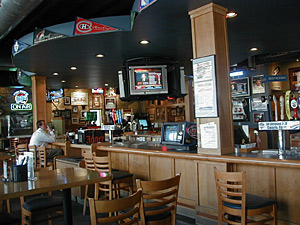|
Audio
Photos
|
February 16, 2005
The Minnesota Wild season that never started -- never will. The National Hockey League has cancelled the pro hockey season because of a contract dispute. Even though the announcement was widely expected, it is painful for for some St. Paul businesses. For the regional economy, though, the impact of losing pro hockey is less clear.
St. Paul, Minn. — The official end of the NHL season caught no one by surprise. The vast gulf between players and owners on player salaries has been apparent for at least a year, and players were locked out at the start of the exhibition season in September.
NHL Commissioner Gary Bettman stepped to a microphone in New York to announce that even some last-minute momentum had not come soon enough. "As I stand before you today, it is my sad duty to announce that it is not possible to have even an abbreviated season," Bettman said.
For the league, the economics are simple: Owners say current trends in player salaries are bankrupting them, and they want a salary cap, like the NBA and NFL. Players say the owners' proposals put undue limits on their earning potential. Right now The Wild has a relatively low payroll, and a healthy bottom line. But team officials agree the league's financial health -- and the Wild's in the future -- are at stake.
For Minnesota, the metro area, and the city of St. Paul, it's tricky to parse out the economic impact of a whole season without Minnesota Wild hockey.
"St. Paul is fortunate, actually," says Matt Smith, St. Paul's director of financial services. "The lockouts happened during a period when the overall economy is recovering. Now when we have economic growth resuming, and our general sales tax revenues are going up, that's fortuitous that it's happening even as we're losing revenues from hockey."
With no Wild hockey games going on, collections from St. Paul's half-cent sales tax fell only slightly this fall, compared with the year before. In the month of November, collections actually rose. Some economists see that as evidence sports teams have a negligible economic impact, and don't change the total amount of entertainment dollars spent.
But Smith says it's a question of what might have been. St. Paul is coming up short of its revenue projections, and that's what matters for setting city budgets. Smith blames the lack of hockey for a shortfall he expects to grow.
"We have found ourselves working hard to come up for the financing for one police officer, for example," Smith says. "So in that context, even for a city the size of St. Paul, $60,000 or $70,000 this year, $300,000 next year is significant. Is it catastrophic to lose that? No. Is it important and does it force hard decisions, even at that level? Yes."
What might be more problematic is if the Wild began to struggle with their lease and other payments on the $175 million Xcel Center. Team officials declined to comment on their finances. The team reportedly carries a reserve of $7 million, enough to cover lease payments for at least 18 months. City officials say the team also has a line of credit it has not yet tapped. Other events like concerts and a new pro lacrosse team, The Swarm, still provide revenue in the meantime.
Economists and sports advocates will debate whether money from hockey fans dries up, or simply gets spent elsewhere in the community. Money from big-spending ticket-holders outside the metro area is clearly gone.
Gary Fead, from Omaha, spent a few hundred dollars each time he came to St. Paul.
"You've got hotel stays, any restaurant visits, and that's not counting the concessions at the game," Fead says. "By this time typically I would have probably been up (to St. Paul) for three games by now."
Most Wild fans come from inside the metro area, but outside St. Paul. City officials don't have figures, but suspect downtown St. Paul is by far the biggest loser without a hockey season.
Former Minnesota Northstar Tom Reid doesn't need city figures to know. He owns Tom Reid's Hockey City Pub, just blocks from the Xcel Center. "What this cancellation of the season has done is had a tremendous financial impact on the facilities, the bars, and restaurants that have spent a lot of money in the past few years because of hockey," Reid says. "I can't tell you how many people have lost their jobs because of it."
Reid says his business is still alive thanks to bar regulars and other events in St. Paul. He expects NHL players and owners will strike a deal, and fans will be ready to come back. But just in case things should drag out, he jokes that he's not above a name change for the Hockey City Pub.






